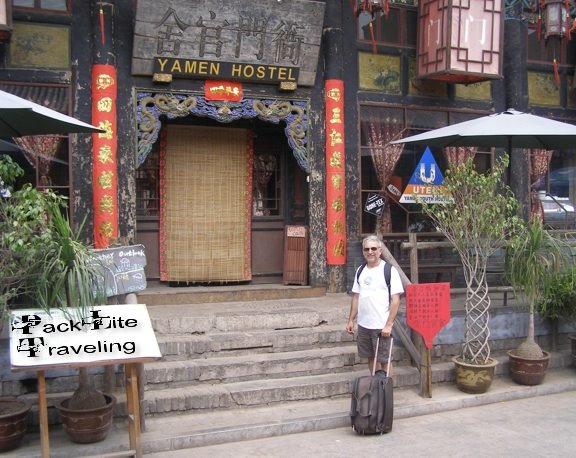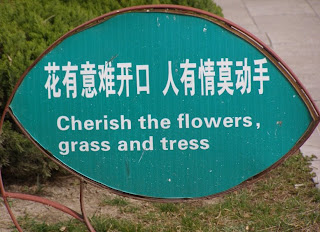Don’t come to China if you can’t use chopsticks. I know I’ve written about this before but it bears repeating. A necessary part of the Chinese experience is dining. There is food everywhere from stands to teeny restaurants to night markets where a cart becomes a kitchen and a makeshift canopy the seating to elegant establishments with smothering service. Eating with a group is so much fun in China. It is the primary venue for social interaction. If you like food you’ll enjoy China as one of the world’s top dining environments. Which leads me to…
Don’t come to China if you are not open to food. You will NOT see the Chinese food you know in the USA, at least not where I’ve been eating. You’ll have some familiar dishes prepared in new ways. Take eggplant. It’s all over. At every restaurant it’s a little (or a lot) different and it’s always good. You’ll have some new foods. In season now are willow leaves—yes, from the willow tree and don’t weep, they are delicious. The Chinese could make rocks taste good. You’re in for great food if you’re willing to dip in your sticks and enjoy.
Don’t come to China if you don’t like mushrooms. A large variety graces a number of dishes and they’re really good. I’ve had some spectacular mushroom soup.
Don’t come to China if you don’t like hot peppers. They’re not in everything but they are one of the most common ingredients. Hard to avoid.
Don’t come to China if you’re addicted to salt. There’s none on the table and rarely any in the food. I like salt too much but I don’t miss it at all. In fact, I’m hopeful that I will cut way back when I return home.
Don’t come to China if you expect water fountains. There aren’t any here. The tap water is not potable. Bottled water, juices, and other drinks are readily available (but very rarely cold). All apartments are outfitted with clean water, the big upside-down dispenser jugs you see all over the USA. Oh, forget about ice, also.
Don’t come to China if you can’t squat. The sit-down toilets here in the foreign experts compound are the only ones I’ve seen so far in Kaifeng. The common toilet is a slit or hole that one straddles.
Don’t come to China if you’re squeamish about toilets. Good news: China is very good on providing public toilets everywhere. Bad news: While those in Beijing are pretty clean and well-attended, the experience elsewhere can only be described as noxious. Older readers will remember the original roadside rest stops, where in summer one fought through a horde of yellowjackets to use the outhouses. Those were palaces compared to the Kaifeng street privy. Take a deep breath and try to do your business as quickly as possible. You’ll live. And always carry your own toilet paper.
Don’t come to China if you don’t want to make friends. If you are around long enough you’ll build relationships and the Chinese will teach you profound lessons in hospitality, respect, friendliness, openness, and undisguised warmth. Prepare to learn and to change your life.








 We first went to Mt. Shizu, the center of the world to the Chinese.
We first went to Mt. Shizu, the center of the world to the Chinese. We started on a concrete road and soon reached the dreaded steps. If I felt a bit challenged by a two kilometer staircase, all I had to do was see some of the elderly Chinese stolidly making their way up and I was reinvigorated. The peak had a shrine to the Yellow Emperor and his most important wife who by legend taught Chinese women to make silk.
We started on a concrete road and soon reached the dreaded steps. If I felt a bit challenged by a two kilometer staircase, all I had to do was see some of the elderly Chinese stolidly making their way up and I was reinvigorated. The peak had a shrine to the Yellow Emperor and his most important wife who by legend taught Chinese women to make silk.
 More adventures to come. Stay tuned…
More adventures to come. Stay tuned…







 cult due to my hairy back. I guess she doesn't do it much to weigoren (foreigners). I asked Yufeng to take some pictures so all you in bloggoland can see these jars hanging off my back, reddened by the rubbing. Besides a little sore skin I can't say if the treatment has contributed to any improvement I might otherwise be experiencing. The doctor recommended that if I feel another cold coming on I should get acupuncture in a couple of specific spots on the back and then come in for the jars. Not sure if any of this has a basis in science but I'm always willing to try anything that doesn't rely on pharmies.
cult due to my hairy back. I guess she doesn't do it much to weigoren (foreigners). I asked Yufeng to take some pictures so all you in bloggoland can see these jars hanging off my back, reddened by the rubbing. Besides a little sore skin I can't say if the treatment has contributed to any improvement I might otherwise be experiencing. The doctor recommended that if I feel another cold coming on I should get acupuncture in a couple of specific spots on the back and then come in for the jars. Not sure if any of this has a basis in science but I'm always willing to try anything that doesn't rely on pharmies.
 ty has a Jewish studies department. One of the professors showed me the center, a couple of rooms with a modest library and small collection of Judaica. Given the difficulty of obtaining relevant books, most of them in English they’ve made an admirable start.
ty has a Jewish studies department. One of the professors showed me the center, a couple of rooms with a modest library and small collection of Judaica. Given the difficulty of obtaining relevant books, most of them in English they’ve made an admirable start.
 Later we visited Shi Lei, a activist intent on promoting interaction among the descendants. He speaks excellent English and has lectured in Israel and the USA. Shi Lei has a room dedicated to a display of pictures, gifts, and a few artifacts. He also is energetic and emotional in his dedication to his unique heritage. In addition to billing as the Curator of Mini-Jewish Museum on Kaifeng Jewry, his card lists him as the
Later we visited Shi Lei, a activist intent on promoting interaction among the descendants. He speaks excellent English and has lectured in Israel and the USA. Shi Lei has a room dedicated to a display of pictures, gifts, and a few artifacts. He also is energetic and emotional in his dedication to his unique heritage. In addition to billing as the Curator of Mini-Jewish Museum on Kaifeng Jewry, his card lists him as the

 o I’m finally becoming proficient). She guided me in getting a park pass so I have unlimited access to the system.
o I’m finally becoming proficient). She guided me in getting a park pass so I have unlimited access to the system.
 I saw this young lady dressed in traditional costume and wanted to take her picture, but just as I was about to ask her boyfriend requested that I pose with her. Westerners are still somewhat exotic here.There are still several major sites to see. The weather is warming, Barb is coming, and the Kaifeng experience continues.
I saw this young lady dressed in traditional costume and wanted to take her picture, but just as I was about to ask her boyfriend requested that I pose with her. Westerners are still somewhat exotic here.There are still several major sites to see. The weather is warming, Barb is coming, and the Kaifeng experience continues.